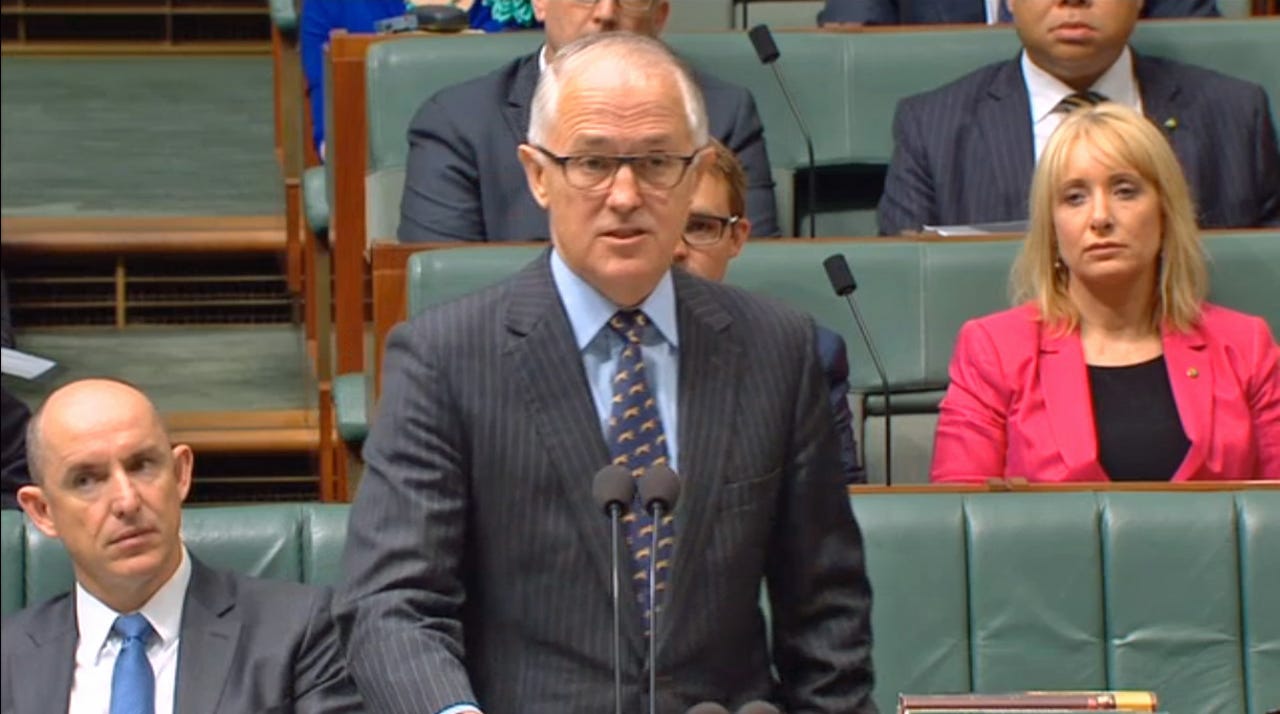Mandatory data retention legislation hits the Australian parliament

The Australian government is rushing mandatory data-retention legislation into the parliament with just over two sitting weeks left in the year.
The Telecommunications (Interception and Access) Amendment (Data Retention) Bill 2014 was entered into the House of Representatives by Communications Minister Malcolm Turnbull on Thursday morning. The Bill will eventually set out the exact type of customer data and the length of time that telecommunications companies will be forced to retain it for the government, to enable access by law-enforcement agencies without a warrant.
In parliament on Thursday, Turnbull said that the customer data, which has still yet to be determined, would be forced to be retained by the companies for two years. Turnbull said that web browsing, URLs, social media posts, and email subject lines would be excluded from being retained.
He said that the legislation is required because existing preservation notices could not ask ISPs to go back and retain data that they have already deleted.
Carriers will be given 18 months to work toward complying with the legislation if it passes the parliament, and the parliament will review the legislation three years after its implementation.
The government also looks to be reducing the number of agencies that would have access to metadata. Under the current legislation, agencies such as the RSPCA and Blacktown City Council have access to metadata in addition to law-enforcement agencies, but the legislation appears to limit access to criminal investigation agencies such as the Australian Federal Police, the Australian Crime Commission, and the Independent Commission Against Corruption.
"The Bill will allow 'traditional' law-enforcement agencies, such as the police, customs, crime commissions, and anti-corruption bodies, to access this information," Turnbull said.
The attorney-general can also grant access to the data to more agencies, subject to parliamentary oversight.
ZDNet understands that the legislation will be directly referred to the Joint Standing Committee on Intelligence and Security, along with a draft data set, for further investigation.
There will also be a joint government and industry working group headed up by the Attorney-General's Department and the Australian Federal Police to work out the technical details and costs of the scheme with the industry.
At a "Stop Data Retention" event in Parliament House on Wednesday, Greens Senator Scott Ludlam, Independent Senator Nick Xenophon, and Liberal Democrat David Leyonhjelm all spoke against the government's mandatory data-retention plans. They were joined by over a dozen groups and organisations concerned about the proposed scheme, including the Institute of Public Affairs, Electronic Frontiers Australia, the Communications Alliance, and iiNet.
iiNet's chief regulatory officer Steve Dalby said that there has been a "complete lack of a businesslike approach" in the government pursuing mandatory data retention, with no case made and no facts provided as to why it is required for data to be retained.
Dalby indicated that if telecommunications companies are forced to retain the data, they would likely look for the cheapest storage around.
"If, as an industry, we are forced to do this, we will be looking for the cheapest, lowest-cost option. And that means cloud storage, and the lowest cost cloud storage today is in China," he said.
Xenophon joked that as Attorney-General George Brandis had branded those against the proposals as "the loony left", then he and Leyonhjelm must be the "loony centre" and "loony libertarian".
"We have to win this. It will have a chilling effect on democracy and our institutions on free speech in this country," Xenophon said.
Leyonhjelm said the fundamental issue with mandatory data retention is whether the government is able to presume that everyone is a potential criminal.
"Should the government have the power to watch us? Are we all potential criminals? Should we watch the government? Which one of us, the citizens or the government, control the police? This idea that the government is entitled to watch all of us is wrong on fundamental grounds," he said.
At the National Press Club on Wednesday, Foreign Minister Julie Bishop also linked the mandatory retention of data with the battle against the terrorists.
"We will also be unrelenting in finding the details of where he's been, who his contacts are, and who he's called," she said.
"That's why the retention of metadata is going to be absolutely essential for us to carry out the kind of work that is required to ensure that we can keep Australia as safe as possible."
At a press conference this morning, Ludlam warned that the legislation could be passed before the end of the year.
"In introducing this Bill today, the government probably does intend to smash it through before the end of the year," Ludlam said.
